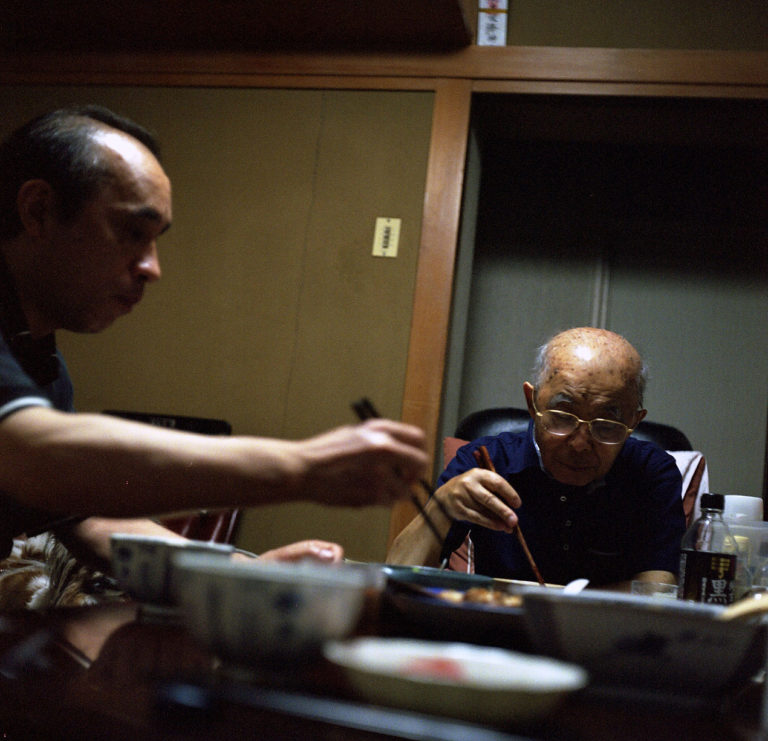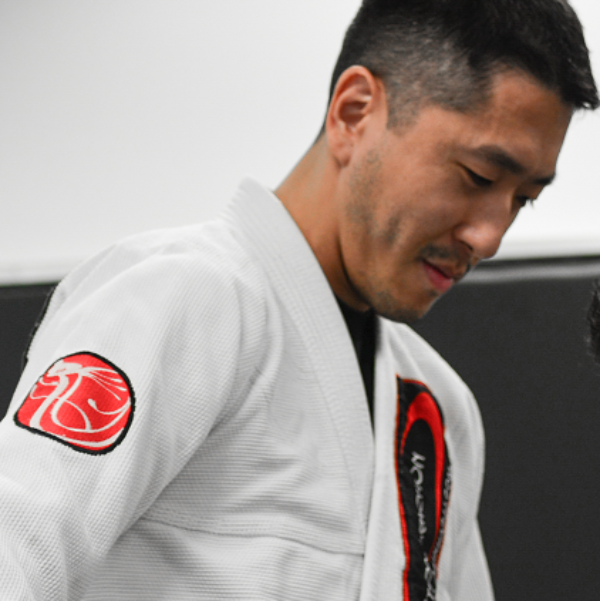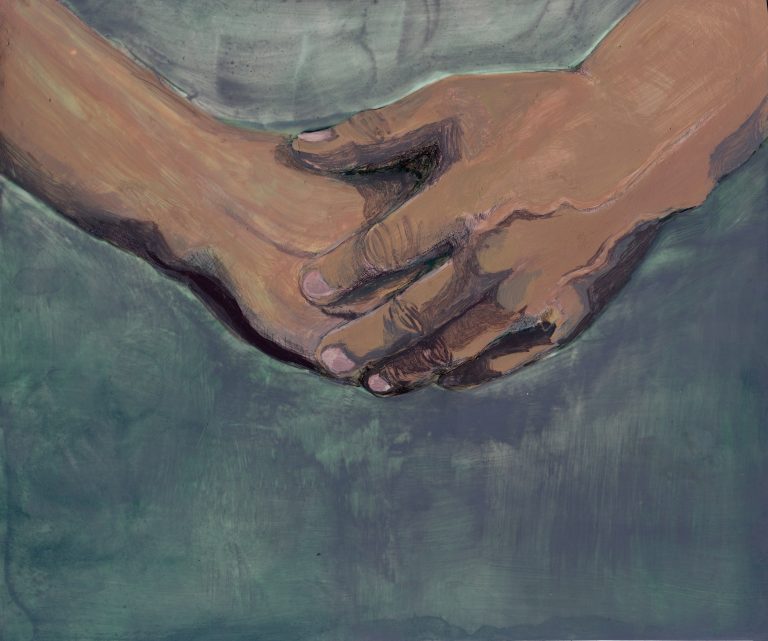
Image by Hisako Ninomiya.
That Type of Father
Fathers are teachers. If I were to hold my Korean father to the same standard that I saw on American television — the “best friend” — then he didn’t live up to my expectations. If I appreciate him for what he was, a hard man with PTSD who taught me the value of toughness and self-reliance, then he was successful.
He stressed the importance of continuous learning. Not just school education, as he saw that as the bare minimum. He appreciated self-learning.
As I arrived late into his life, my father has always been up-front with me about his age and the concept of mortality, that I would still be relatively young when he was no longer alive. He pushed me to learn. With limited English, in a country where he never found his bearings, he knew for his son that only self-learning could protect him. That would be my shield. It would last longer than any material possession he could leave.
I resented it at first. He didn’t have a soft touch. When I moved out, I had to make decisions, real decisions. I had to deal with the uncertainty that comes with being an adult. Yet, oddly, I felt prepared. It was only then that I began to connect the dots, tracing the outlines of my father, and why I cannot think about learning without seeing his face. The urgency to learn not for good grades, but because knowledge would guide me as a parent would — if a parent could.
I still carry that shield, and it has served me well.
There were many times our relationship was challenged, many times he challenged me to do more, read more, and be more. I resisted, of course. For a child, defiance is freedom. It is where we search for identity. “It’s my life,” and “he” is my father. That’s how it was, and that’s how it was supposed to be — or so I thought. In the books I read and the programs I watched, in the minds of peers and adults alike, we are the protagonists.
There were times of intense criticism. There were also times when my father was quiet. He let me be. I would create character sketches of my father in my mind, but he never fit any trope. He was a stern father who never forced his son to do anything. Everything was still ultimately my choice. Then, perhaps, I was the teen angst stock character.
When my father was withdrawn, I wondered what he was thinking. And in putting myself in his shoes, I realized — from his perspective, it was his life, and I was his son. In his narrative, he was the lead, and I was a character in his story, just as he was a character in mine. Then I wondered, did he also have the same thoughts as a young man? Did he wonder what I was thinking when I resisted something that was obviously good for me?
He and I were bound as father and son, but, as beings, we had our own individual lives that were ours to lead. We were independent, and our unity was voluntary.
As scary as he was, he only gave opinions. Decisions regarding my own life were left to me. He gave his dissenting opinions, but he never punished me for my decisions. He allowed me to be self-governing. I only thought as far as tomorrow. He thought about my life in its entirety, now, and after. That’s what a parent does: develop abilities in the child that the child may not see the need for. Looking out for someone means looking ahead. And if you love someone enough, you look beyond your own lifetime.
He challenged me, but it was my choice to leap. Rather than continuing to resist challenge, I cultivated it. I wanted to grow it as an inner muscle. Meeting challenge has become a habit; I run towards it. That’s my father’s influence.
Probably the nicest thing he ever said to me wasn’t even to me; it was to my mother. I was taking a solitary, four-month road trip across the continental United States. My mom was worried, and my father said to her:
“Don’t worry about him. Whatever he does, wherever he goes, he’ll live.”
It was his way of saying I was a survivor and he had no worries, no matter the trials.

When my fiancée, Michelle (who’s now my wife), met my father, he was well into his 80s. Upon meeting her, he didn’t make a fuss.
When lunch was over, my father decided to walk to the store. When he left, Michelle and I grabbed our coats and rushed to catch up to him. My mom told us to let him go alone and that he would be insulted if we were to tag along, but we went anyway.
Still proud and independent, he told us to go home. I said to him, “We’re bored. So we’re following you.” But I was worried. The years of color he had accumulated from working outside had turned pale. His fierce eyes were drawn in. It was my turn to watch over him. We gave him space to walk; I didn’t want him to feel frail.
I jokingly told Michelle to grab his hand and walk with him. My father doesn’t hold hands, not with me, not with my mom, not even with his grandchildren, so I expected him to pull away, as he does with everyone, and I would have a good laugh.
Yet, when she grabbed your hand, you didn’t resist.
You allowed her to walk with you.
Too modest to acknowledge her, but still, you held on.
And I know you did that for me.
Having never experienced the family outings I’ve seen on television, they are, to me, works of fiction. But to me, that moment, that was real.
Our fathers teach us. In turn, we teach our fathers — about being a man, about becoming an adult, and, most of all, about fatherhood.
We designate days for ourselves, our lovers, mothers, and fathers. A separate day to celebrate, a different day to give thanks. The failing of our daily life is when we miss those opportunities to make each day a Father’s Day, a day to tell someone, for no particular reason, that we love them. And in the case of my father, a simple nod of respect. There are no rules, there is a context to each family. It took me a long time to discover that.
My father always said to me,
“I’m not your friend. I’m your father.”
He was that type of father. He was a wartime dad during a time of peace. Do you know the type? Do you have one? They won’t be celebrated; greeting cards won’t use a likeness of them. But that was my father.
I cherish you. I’m glad we got there before the end.
When the time was near,
I asked you if there was anything you wanted to say.
You looked at me and said, “No.”
I laughed aloud.
I know what he would have said if he had had the energy, “You got the wrong guy. You think this is a movie?” With all the anguish, that was the perfect thing to say. He hated melodrama, and he stayed true to himself. And if it were a film, it couldn’t have been scripted better.
He knew I loved movies, and he would always tell me not to compare life to them. Not because I would be disappointed, or to prepare me for the harsh realities of the world. He meant it isn’t a fair way to judge life. That there are no rules. There are no rules to grieving. Each person’s experience has its own texture. Each family paints on their own canvas. This awareness was not inherent; it was taught to me. By him.
If “father” is the name for teacher on the lips of children,
then you have taught me well.
Thank you.
To the fathers we have and to the ones we’ve lost.


